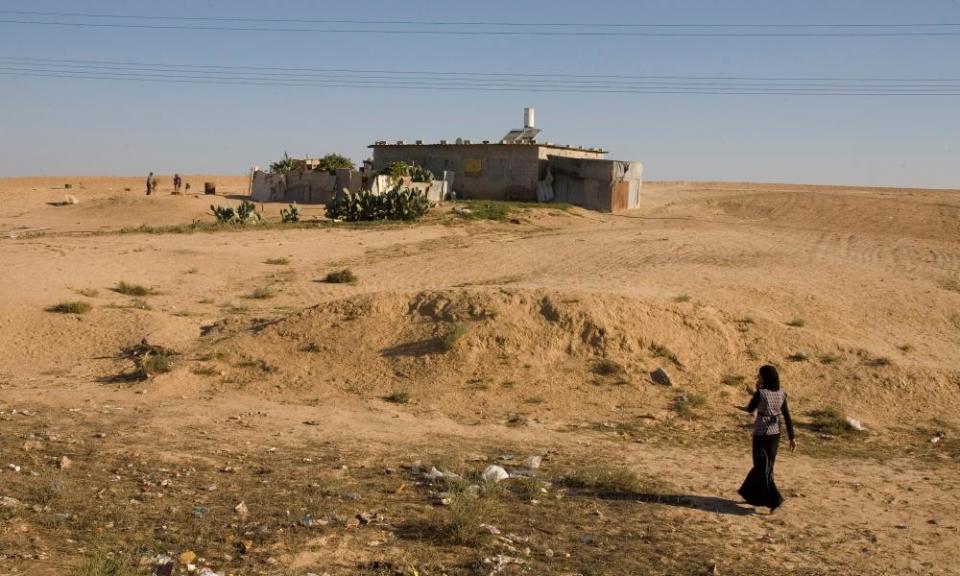Minor Detail by Adania Shibli review – horror in the desert

The two halves of Palestinian author Adania Shibli’s slim, searing novel are bound by both minor and major details: a brutal gang rape and murder, the punishing heat, the eerie presence of a dog in distress and two nameless characters. The first is a fastidious, quietly malevolent Israeli platoon commander who organises the gang rape and murder of a young Bedouin. The second is a woman in Ramallah who stumbles upon the story in a newspaper decades later and becomes haunted by one minor detail – the fact that the girl’s assault happened 25 years to the day before she was born.
The first section unfolds over four days in 1949 as the commander leads his men on sweeping patrols of the Negev, or Naqab, desert in order to “cleanse it of any remaining Arabs”. The soldiers chase the sound of barking that echoes through the sand dunes, finding nothing for days until they finally come across a band of Palestinians resting by a spring. The Israelis kill the unarmed Arabs and their camels, their blood absorbed into the greedy sand. Only a weeping girl “curled up inside her black clothes like a beetle” and a dog survive.
The commander is obsessed by purity and order. A sadist capable of unflinching savagery, he lies awake at night suffering the aches and pains of a spider bite. He is an occupier, a man at war, and Shibli reveals his sinister power slowly, with a delicate touch. That night, over a celebratory meal, the commander congratulates his men, extolling the finer points of their Zionist mission – erasing the “sterile nationalist sentiments” of the Arabs and planting the fertile seeds of their own nationalist expansion. Only they can make the “desolate” desert “bloom”, he promises. At the end, the commander offers his men a choice regarding their prisoner – shall they put the Palestinian girl to work in the camp kitchen? Or shall they share her among themselves?
The Negev gang rape at the heart of Minor Detail is a true story, carried out by Israeli soldiers in 1949. Another minor detail: according to declassified documents, the real-life commander answered his superior’s question on whether the girl was eventually returned to her village by reporting that his soldiers killed her because “it was a shame to waste the petrol”.
Shibli’s writing is calm and tightly controlled, lyrical in its descriptions of cruelty and uncertainty
The atmosphere is one of unbearable tension, measured by the increasing anxiety of the dog who stands as helpless sentry over the girl. He howls and cries, pants and trembles, barking endlessly. Shibli’s writing is calm and tightly controlled, lyrical in its descriptions of cruelty and uncertainty. The terror Shibli evokes intensifies slowly, smouldering, until it is shining off the page.
The second section of the novel follows a Palestinian woman as she hunts down information about the crime decades later. What ought to be an ordinary search – visiting two museum archives – becomes a logistical nightmare for someone living under occupation. Palestinians are forbidden free movement. Millions are confined to controlled zones, with a draconian permit system if they wish to travel from one zone to another. The unnamed woman is a resident of Area A and must travel into Area C, an impossible idea even for those who live in Area B. The divisions are absurd and Shibli’s amateur sleuth professes an inability to properly identify borders even as she navigates their suffocating restrictions. She persuades a colleague to give her their Area C identity card and someone else to rent her a car with the correct colour licence plate, and sets off on her mission. Shibli’s own minor details – the water pressure in a settlement guesthouse, the bored and vindictive teenage soldiers at a checkpoint, villages that appear and disappear depending on whose map you’re reading – glitter with meaning throughout the text.
Minor Detail is Shibli’s third novel. At the Adab festival in Karachi earlier this year, she spoke of writers who do the bidding of governments. In the case of Israel, critical writers are impeded while more favourable ones are encouraged to travel and speak, presenting a human face to the state by acknowledging certain mistakes while presenting the warm offer of dialogue to smooth over injustices. “I want a monologue,” Shibli said. “The dialogue so far is: Go there, give me your ID. OK Sir…There is a discourse that needs to be put and it’s my turn now.”
All novels are political and Minor Detail, like the best of them, transcends the author’s own identity and geography. Shibli’s writing is subtle and sharply observed. The settlers and soldiers she describes in the second half of the novel are rendered with no malice or artifice; she writes of an elderly settler’s veined hands with tenderness, and as an author is never judgmental or didactic. The book is, at varying points, terrifying and satirical; at every turn, dangerously and devastatingly good.
• Fatima Bhutto’s The Runaways is published by Penguin. Minor Detail by Adania Shibli, translated by Elisabeth Jaquette, is published by Fitzcarraldo (£12.99). To order a copy go to guardianbookshop.com. Delivery charges may apply.

